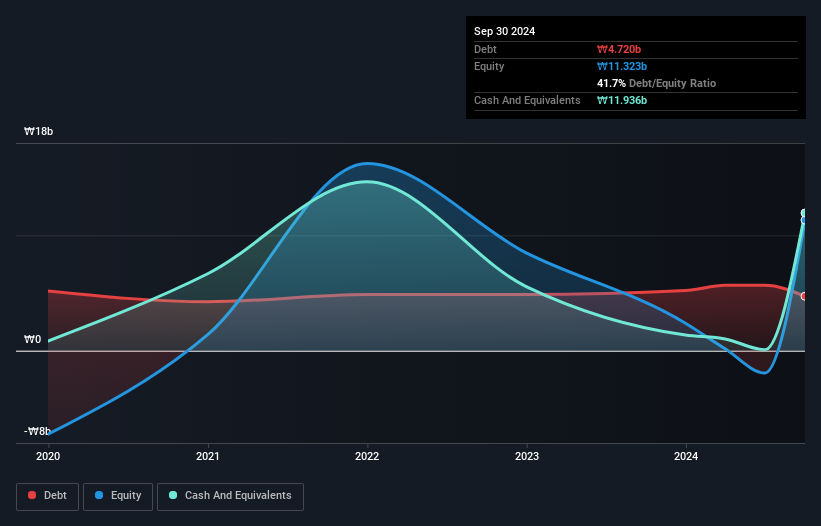- South Korea
- /
- Biotech
- /
- KOSDAQ:A373110
Despite Lacking Profits Xcell Therapeutics (KOSDAQ:373110) Seems To Be On Top Of Its Debt

Warren Buffett famously said, 'Volatility is far from synonymous with risk.' So it seems the smart money knows that debt - which is usually involved in bankruptcies - is a very important factor, when you assess how risky a company is. As with many other companies Xcell Therapeutics Inc. (KOSDAQ:373110) makes use of debt. But the real question is whether this debt is making the company risky.
When Is Debt Dangerous?
Debt is a tool to help businesses grow, but if a business is incapable of paying off its lenders, then it exists at their mercy. Part and parcel of capitalism is the process of 'creative destruction' where failed businesses are mercilessly liquidated by their bankers. However, a more common (but still painful) scenario is that it has to raise new equity capital at a low price, thus permanently diluting shareholders. By replacing dilution, though, debt can be an extremely good tool for businesses that need capital to invest in growth at high rates of return. When we think about a company's use of debt, we first look at cash and debt together.
Check out our latest analysis for Xcell Therapeutics
What Is Xcell Therapeutics's Net Debt?
The image below, which you can click on for greater detail, shows that Xcell Therapeutics had debt of ₩4.72b at the end of September 2024, a reduction from ₩5.22b over a year. But it also has ₩11.9b in cash to offset that, meaning it has ₩7.22b net cash.

How Healthy Is Xcell Therapeutics' Balance Sheet?
We can see from the most recent balance sheet that Xcell Therapeutics had liabilities of ₩5.00b falling due within a year, and liabilities of ₩2.93b due beyond that. Offsetting this, it had ₩11.9b in cash and ₩777.0m in receivables that were due within 12 months. So it actually has ₩4.78b more liquid assets than total liabilities.
This short term liquidity is a sign that Xcell Therapeutics could probably pay off its debt with ease, as its balance sheet is far from stretched. Simply put, the fact that Xcell Therapeutics has more cash than debt is arguably a good indication that it can manage its debt safely. There's no doubt that we learn most about debt from the balance sheet. But it is Xcell Therapeutics's earnings that will influence how the balance sheet holds up in the future. So when considering debt, it's definitely worth looking at the earnings trend. Click here for an interactive snapshot.
Over 12 months, Xcell Therapeutics reported revenue of ₩1.9b, which is a gain of 77%, although it did not report any earnings before interest and tax. With any luck the company will be able to grow its way to profitability.
So How Risky Is Xcell Therapeutics?
Statistically speaking companies that lose money are riskier than those that make money. And we do note that Xcell Therapeutics had an earnings before interest and tax (EBIT) loss, over the last year. And over the same period it saw negative free cash outflow of ₩7.6b and booked a ₩9.8b accounting loss. But at least it has ₩7.22b on the balance sheet to spend on growth, near-term. With very solid revenue growth in the last year, Xcell Therapeutics may be on a path to profitability. Pre-profit companies are often risky, but they can also offer great rewards. When analysing debt levels, the balance sheet is the obvious place to start. However, not all investment risk resides within the balance sheet - far from it. We've identified 4 warning signs with Xcell Therapeutics (at least 1 which makes us a bit uncomfortable) , and understanding them should be part of your investment process.
At the end of the day, it's often better to focus on companies that are free from net debt. You can access our special list of such companies (all with a track record of profit growth). It's free.
New: AI Stock Screener & Alerts
Our new AI Stock Screener scans the market every day to uncover opportunities.
• Dividend Powerhouses (3%+ Yield)
• Undervalued Small Caps with Insider Buying
• High growth Tech and AI Companies
Or build your own from over 50 metrics.
Have feedback on this article? Concerned about the content? Get in touch with us directly. Alternatively, email editorial-team (at) simplywallst.com.
This article by Simply Wall St is general in nature. We provide commentary based on historical data and analyst forecasts only using an unbiased methodology and our articles are not intended to be financial advice. It does not constitute a recommendation to buy or sell any stock, and does not take account of your objectives, or your financial situation. We aim to bring you long-term focused analysis driven by fundamental data. Note that our analysis may not factor in the latest price-sensitive company announcements or qualitative material. Simply Wall St has no position in any stocks mentioned.
About KOSDAQ:A373110
Xcell Therapeutics
Engages in the development and production of drugs for cell therapy.
Excellent balance sheet slight.
Market Insights
Community Narratives




